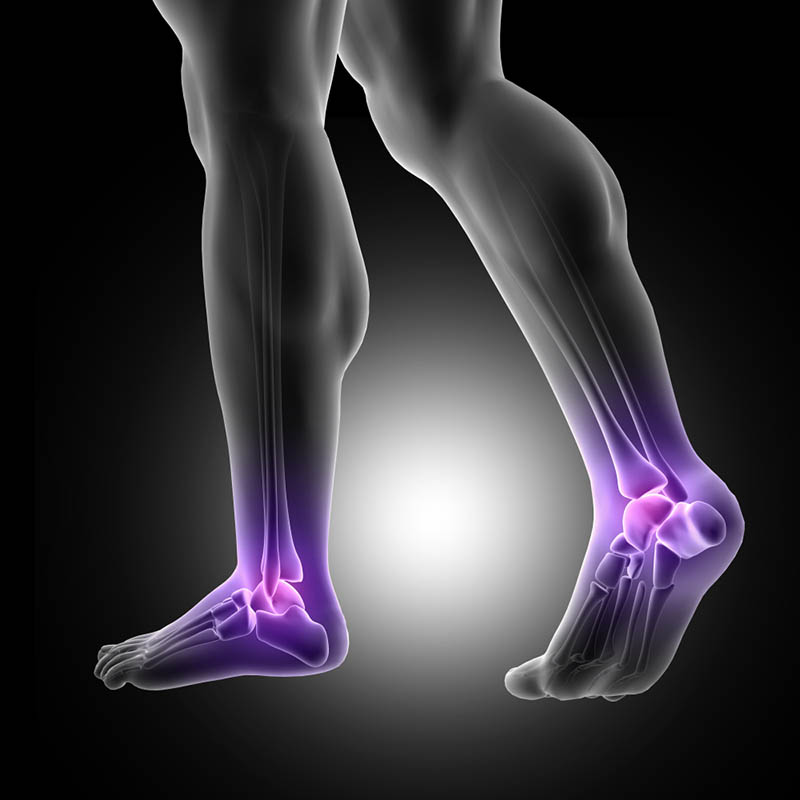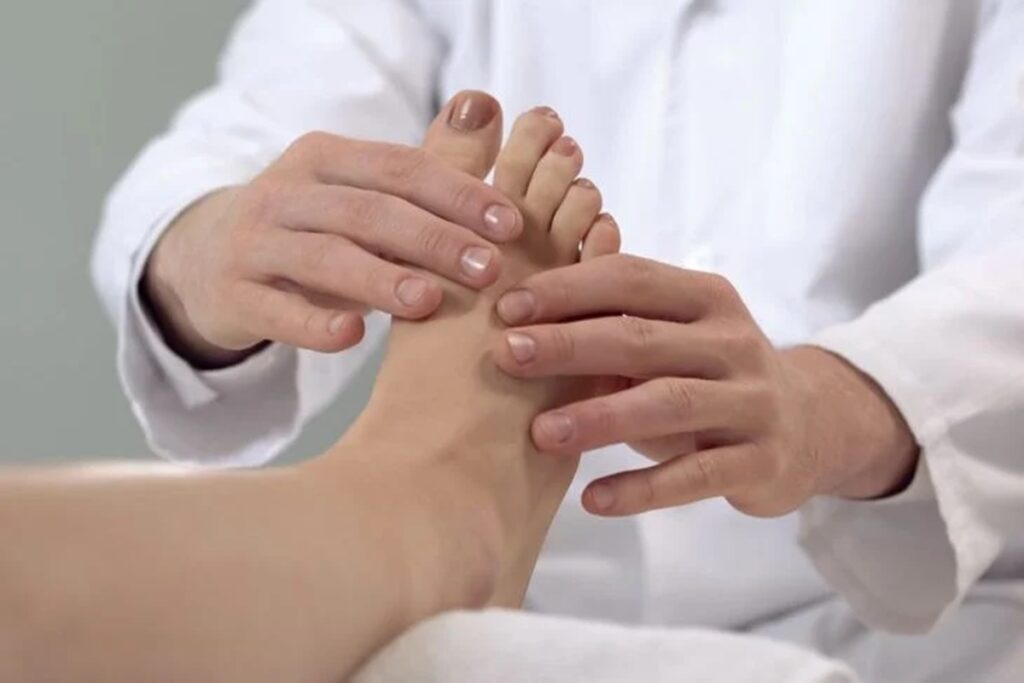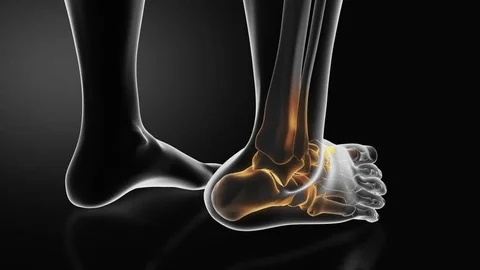Neuropathy in the feet is a complex nerve condition that can affect sensation, movement, and quality of life. It often brings symptoms like burning, tingling, or numbness, which can worsen over time if not addressed. Effective treatment for neuropathy in feet focuses on identifying the root cause, relieving pain, and protecting your feet from further …
Neuropathy in the feet is a complex nerve condition that can affect sensation, movement, and quality of life. It often brings symptoms like burning, tingling, or numbness, which can worsen over time if not addressed. Effective treatment for neuropathy in feet focuses on identifying the root cause, relieving pain, and protecting your feet from further damage.
Seeing a podiatrist near you early ensures you get specialized care, testing, and the most up-to-date solutions. Whether you need conservative pain relief, advanced diagnostics, or surgical evaluation, a foot specialist can create a plan that fits your lifestyle and medical needs.
What is neuropathy in the feet
Neuropathy in the feet happens when the nerves that send signals to and from the brain and spinal cord become damaged or impaired. This can affect how your feet feel, how they move, and even how well they heal after injuries.
It’s a condition that requires careful diagnosis, because the underlying cause determines the most effective treatment for neuropathy. Some cases respond to dietary supplements such as alpha-lipoic acid, benfotiamine, or vitamin B12, while others may require medication, physical therapy, or even nerve repair surgery.
Common causes: diabetes, vitamin deficiency, chemo, nerve compression, injury, idiopathic cases
Diabetes is the most common cause, often linked to poorly controlled blood sugar levels. Other triggers include vitamin B12 deficiency, nerve compression from foot or ankle injuries, chemotherapy drugs (like proteasome inhibitors), and autoimmune disorders. In some cases, genetic testing reveals inherited nerve conditions, while others remain idiopathic. Identifying the exact cause is crucial for tailoring treatment for neuropathy in feet.
Typical symptoms: tingling, burning, numbness, balance changes, night pain
Early symptoms can feel like pins-and-needles, progressing to burning pain, muscle weakness, or balance problems. Some patients develop numbness or tingling that interferes with walking, while others notice pain worsening at night. Ignoring these symptoms increases the risk of foot injuries, ulcers, and infections.
First steps: identify and treat the cause
Successful treatment for neuropathy in feet always starts with finding out why it’s happening. By treating the root cause, you can slow progression and improve long-term outcomes.
Labs and exams to find the “why”: blood work, neuro exam, EMG/nerve tests, imaging when needed
A thorough evaluation may include blood tests, neurological exam, nerve conduction study, electromyography (EMG), or imaging like MRI scan or CT scan. Additional options include nerve biopsy, skin biopsy, and nerve ultrasound for structural issues. Your provider may also recommend genetic testing or sensory tests if inherited nerve conditions are suspected.
Diabetes management, nutrition, activity, smoking/alcohol limits
If diabetes is the cause, keeping blood sugar levels in range is essential. Others may need a diet rich in vitamins, proper nutrition, or lifestyle changes like quitting smoking and limiting alcohol intake. Low-impact exercise and walking exercises can improve blood circulation, while yoga or tai chi can support balance and overall wellness.
The approach to treating peripheral neuropathy is determined by both the type and severity of symptoms as well as the root cause. In some cases, the underlying condition cannot be reversed, but treatment can help slow progression and manage discomfort. For instance, people with diabetes can benefit from improving blood sugar control, quitting smoking, and reducing alcohol intake to protect nerve health.
Evidence-based treatments that relieve foot neuropathy
Peripheral nerve damage, whether from injury, surgery, or chronic conditions like diabetic neuropathy, can cause persistent pain that is often challenging to diagnose and manage. This type of nerve pain may require a combination of targeted therapies and lifestyle strategies to achieve meaningful relief.
When addressing symptoms, a combination of medical and holistic approaches can enhance results.
Medications for nerve pain: pregabalin or gabapentin; duloxetine or other SNRIs; topical lidocaine or capsaicin
Common medications include gabapentin, pregabalin, duloxetine, tricyclic antidepressants like amitriptyline, and topical agents such as capsaicin cream or lidocaine patches. For inflammatory causes, immunosuppressants or immunomodulating drugs may be prescribed.
Physical therapy, balance training, and protective footwear to prevent falls and pressure injuries
Physical therapy builds strength, while balance exercises and strengthening exercises lower fall risk. Using custom orthotics, splints, or rocker style shoes can reduce pressure and prevent sores. Pool-based exercise or occupational therapy may also be part of the plan.
Pain-modulating options when needed: TENS, injections, or neuromodulation
Techniques like transcutaneous electrical nerve stimulation (TENS), scrambler therapy, and spinal cord stimulator implants may help those with severe symptoms. In select cases, acupuncture, massage therapy, or biofeedback can provide additional relief.
When surgery is considered
Peripheral nerve decompression or repair for entrapped or damaged nerves after thorough evaluation
If nerve compression is confirmed, procedures such as Peripheral Nerve Surgery may be appropriate. Learn more in our guide What is Peripheral Nerve Surgery?.
Goals and candidacy: relieve compression, improve function, reduce pain in select patients
Surgery is typically reserved for patients whose symptoms persist despite conservative care. The aim is to relieve nerve pressure, improve sensation, and restore mobility.
Foot care that protects numb or painful feet
Daily prevention habits are just as important as medical treatments.
Daily inspection, shoe/insert guidance, and pressure offloading to prevent sores and infections
Check your feet every day for injuries, redness, or swelling. Use supportive shoes or custom orthotics to reduce risk. Patients with diabetes should be especially vigilant due to the early stages of diabetic foot ulcers risk.
Red flags that need urgent care: infected wounds, color change, rapidly worsening pain, new weakness
Seek urgent care if you notice infected wounds, sudden color changes, or new weakness. Prompt evaluation from the best podiatrist near you can prevent long-term complications.
Best podiatrist near you: who treats neuropathy in feet
Why podiatrists are key for foot neuropathy care and prevention of complications
A podiatrist near you is trained to recognize subtle signs of nerve damage, provide specialized care, and coordinate with other specialists when needed. They use the latest research developments and innovations to create individualized care plans.
Local care in Brookfield, WI
Patients can receive Podiatric Clinical Care in Brookfield, Wisconsin, with access to advanced diagnostics, preventive foot care, and surgical options.
At-home support while you await your visit
While waiting for your appointment, there are several steps you can take at home to protect your feet and manage discomfort. These strategies are not a replacement for professional care but can help reduce symptoms and prevent further nerve damage until you see your podiatrist.
Activity plan, gentle exercise, and balance work that pair with medical care
Simple activities like walking aids, stretching, and strength exercises can help maintain mobility. Always follow your podiatrist’s guidance for safety.
Safety tips to avoid burns, wounds, and falls when sensation is reduced
Avoid walking barefoot, wear shoes indoors, and remove tripping hazards from your home. Use cold therapy or cryotherapy for swelling reduction, but check skin frequently to avoid injury.
Conclusion
The most effective treatment for neuropathy in feet is tailored to the underlying cause and includes both medical interventions and preventive care. Whether it’s medication, physical therapy, or advanced surgical options, partnering with a skilled podiatrist near you ensures the best chance at relief and long-term foot health.
FAQs
What is the best cure for foot neuropathy?
There is no one-size-fits-all cure, but combining medical treatments, lifestyle changes, and foot protection can dramatically improve quality of life.
What are the first signs of neuropathy in your feet?
Tingling, burning pain, or numbness in the toes are common first signs. These can progress to weakness or loss of coordination.
What is the best exercise for neuropathy of the feet?
Low-impact activities like tai chi, yoga, and gentle walking exercises can improve blood flow and balance while reducing strain on sensitive nerves.






